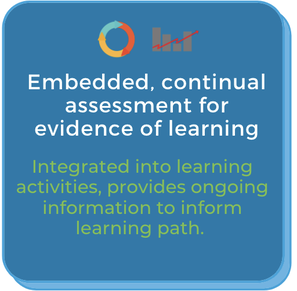
As you shift your classroom to allow for students to have some control over the pace of their learning, building in accountability and embedded assessments are essential for two reasons.
1. Your students need to know you are holding them accountable for engaging in and understanding learning experiences- not just going through the motions.
2. You need evidence that students are actually learning, making progress, and mastering learning goals so you can personalize.
We get the “retake” question often.
Giving students multiple attempts to show mastery is important. It promotes growth mindset, learning as a process, and motivates students to continue learning. Traditional one-shot, end of unit assessments leave many students feeling defeated and further unmotivated.
Here are 4 keys to setting up your assessments and retakes to promote learning & student ownership instead of compliance:
1. Analyze your assessments
Your evidence of learning is only as good as your assessments. (Remember we are collecting formative assessment data as students are learning so we can personalize)
- What evidence of learning are you collecting?
- Does it reflect the depth of the standard or learning target?
- Will the results provide students with information about what they know and still need to learn?
2. Use a pre-assessment
Pre-assessment gives you and the student information about where students start in a lesson block or unit
- If students already know the content or have mastered a skill, they can then engage in a learning experience that requires them to transfer and apply in a more complex way. If a student needs remediation, you will have the evidence and can meet with them in a small group to close the gaps.
3. Build in accountability
Avoid the retake “game” (ie....I will keep taking this assessment until odds are I get the right answers- we have all had that experience!!)
Set parameters such as students can not retake a check-in/assessment until they have engaged in additional learning. (They have to put forth some effort and time!)
For example, after each check-in have students complete a google form (This will give you an ongoing spreadsheet to manage student progress) Here are some sample questions:
- What do you still need to learn?
- What will you do to learn this? (You may give ideas here- students usually need to go back and reengage in their notes/resources, practice or meet with the teacher)
- What questions do you have?
- Would you like to retake the check-in after learning more?
4. Don't give the same assessment for retake.
Students quickly learn that it is important to engage in learning vs just getting and giving the right answer.
- Create a couple of versions of a check-in/assessment with different scenarios or questions in different order focused on the same learning targets.
- And/or use embedded assessment by modifying a learning task to give evidence of learning.
